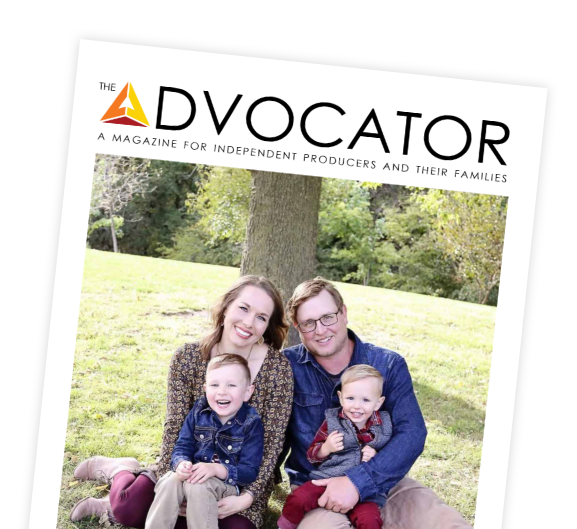South Dakota rancher Wyatt Mollman knows you must have a passion for agriculture to succeed. At the same time, farmers and ranchers should embrace the demands they face, as he says, “The work is the reward, as together with family and friends, we get to do what we love each day.”
Living close to the North Dakota border by the small town of Morristown, Wyatt says that while growing up on a ranch, he developed an early affection for ranching. His family’s income came mainly from their black Angus herd, and he was always very involved in the day-to-day operations, which included calving, haying, and a variety of chores. Wyatt reminisces, “The thing I loved most was branding. At a very young age, I would tag along with my dad to the neighbor’s brandings and later hire out for branding help, even missing some days from school.”
After he finished high school, Wyatt worked for various West river ranchers in his area. He says, “These experiences showed me that there are numerous ways to run a ranching operation, and I learned many valuable lessons.” While working, he started purchasing cows to start his small herd. Then, in the spring of 2009, he took a leap of faith to launch his fencing company. Wyatt explains, “This helped me afford to rent land and expand my cow herd a little at a time.” The income from the fencing company and the earnings from Wyatt’s wife Nicole’s off-ranch job provided the cash flow necessary to expand.
You learn what you live
As the operation expanded, Wyatt says he learned many important life lessons, as he states, “If you take care of the land and livestock, they will take care of you.” His upbringing helped prepare him for the challenges that accompany ranching; as he says, “There will always be hard times, so you make sure to enjoy the good times.” Over the years, Wyatt realized the best approach to working with others, as he advises, “People and customers are generally all good. If you treat them well and are honest and fair, they will be there to help you and your business grow.” There were even some unexpected blessings found through ranching, as he comments, “We make great friends in this business, and we trade help and support each other through the good times and the bad.” Wyatt adds, “This is probably something that I enjoy most.”
The Mollman operation consists of about 700 head of black/bwf cows and 200 bred heifers. The calving season usually lasts from late March to June, with weaning scheduled for the first part of November and the feeding phase lasting until the middle of February. At that time, the heavy steers are marketed, and the remaining calves stay on feed until May, when they are turned out on grass. Light steers and spayed heifers are run as yearlings prior to August when they are sold. The crops include alfalfa, grass, oats, millet, and corn; all are put up for feed.
A family business
Unlike many other professions, Wyatt feels that ranching and farming often require the entire family’s support. Nicole works full-time at a local bank and handles the bookwork and finances for the operation. Their children Trey, Callie, and Chase help with chores that include feeding hay, bucketing grain to the calves, ensuring bottle calves are fed, or just opening gates. The warmer months can mean all hands on deck; as Wyatt says, “We are all involved in putting up hay in the summer.” Luckily, the oldest son Trey is old enough to drive and has been an enormous help with the hay and forage harvest. When the ranch requires more hands than the immediate family can handle, Wyatt’s parents live four miles away and are very helpful when needed.
Raising a family on a farm or ranch is often a test of stamina, as there is always work to be done. Wyatt says his children are used to the demands of the business, as he comments, “The kids have never known any other way. We just do what needs to be done and hope to sneak in a few fun times off the ranch.”
Facing challenges
Over the years, the Mollmans have faced many challenges, and Wyatt feels that drought and spring storms during the calving season are always tough. Yet he says that the most significant test to them and the beef industry has come from the cattle markets of the last seven years. “Input costs keep increasing, but the income has not followed.” While it is still early, Wyatt says that 2023 is projected to be a better year for the cattle industry. At the same time, the ranch isn’t immune from the labor shortages most other businesses are tackling. He realizes that the difficulty in finding and retaining good employees continues to rise, and he will keep searching for ways to solve his staffing issues.
Pairing the hard work required to operate a ranch with the additional challenges of weather, markets, and adequate staffing, many wonder why people still choose to ranch or farm. Wyatt states, “Agriculture is a hard way of life, and if you don’t love it from the start, you may not find it as rewarding.” What he finds rewarding is the days on the ranch when he gets to witness the birth of his calves and watch them progress through all their growth stages until they are marketable animals. Those are the most gratifying moments, as Wyatt says, “You get a sense of pride from all the hard work that you have put into the herd.” When he sees younger producers starting in the business, he hopes that sense of pride will help carry them through the more challenging times. Wyatt offers this advice, “Find a mentor. Be open-minded to new ideas. Ask for advice and observe what other successful operations are doing, as this is what has helped me the most.”
